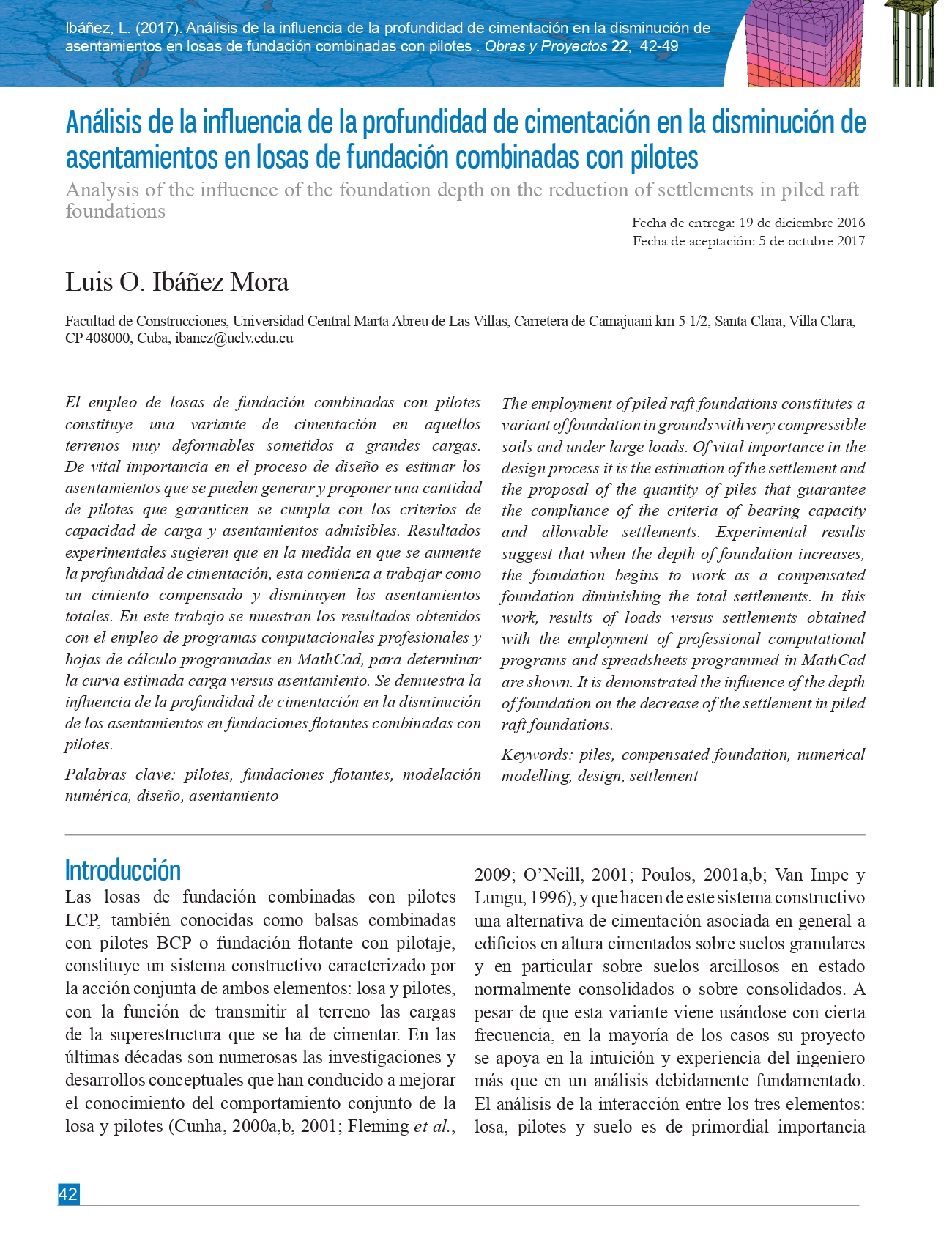Analysis of the influence of the foundation depth on the reduction of settlements in piled raft foundations
DOI:
https://doi.org/10.4067/S0718-28132017000200042Keywords:
piles, compensated foundation, numerical modelling, design, settlementAbstract
The employment of piled raft foundations constitutes a variant of foundation in grounds with very compressible soils and under large loads. Of vital importance in the design process it is the estimation of the settlement and the proposal of the quantity of piles that guarantee the compliance of the criteria of bearing capacity and allowable settlements. Experimental results suggest that when the depth of foundation increases, the foundation begins to work as a compensated foundation diminishing the total settlements. In this work, results of loads versus settlements obtained with the employment of professional computational programs and spreadsheets programmed in MathCad are shown. It is demonstrated the influence of the depth of foundation on the decrease of the settlement in piled raft foundations.
References
Burland, J.B. (1995). Piles as settlement reducers. 19th Italian Congress on Soil Mechanics, Pavia, Italy, 21-34
Cunha, R.P., Poulos, H.G. and Small, J.C. (2001). Investigation of design alternatives for a piled raft case history. Journal of Geotechnical and Geoenvironmental Engineering 127(8), 635-641. https://doi.org/10.1061/(ASCE)1090-0241(2001)127:8(635)
Cunha, R.P., Small, J.C. and Poulos, H.G. (2000a). Parametric analysis of a piled raft case history in Uppsala, Sweden. 4° Seminário de Engenharia de Fundações Especiais e Geotecnia, São Paulo, vol. 2, 381-390
Cunha, R.P., Small, J.C. and Poulos, H.G. (2000b). Class C analysis of a pile raft case history in Gothenburg, Sweden. Conference on Developments in Geotechnical Engineering, Thailand, vol. 1, 271-280
Fleming, K., Weltman, A., Randolph, M. and Elson, K. (2009). Piling engineering. Taylor & Francis
Jiménez Salas, J.A., de Justo Alpañes, J.L. y Serrano González, A.A. (1986). Geotecnia y cimientos. Editorial Rueda. Madrid, tomos II y III
Juárez Badillo, E. y Rico Rodríguez, A. (1969). Mecánica de suelos. Edición Revolucionaria, La Habana, tomos I y II
MathCad (2004). User guide MathCad version 14. http://www.mathsoft.com
O’Neill, M.W., Caputo, V., De Cock, F., Hartikainen, J. and Mets, M. (2001). Case histories of pile-supported rafts. Report for ISSMFE TC18, University of Houston, Texas
Plaxis (2004). Plaxis 3D Foundations. Tutorial manual version 1.6.
Poulos, H.G. (2001a). Methods of analysis of piled raft foundations. Report Prepared on TC18 report on Piled Foundations, ISSMGE
Poulos, H.G. (2001b). Piled raft foundations: design and applications. Géotechnique 51(2), 95-113
Poulos, H.G. and Davis, E.H. (1980.). Pile foundation analysis and design. John Wiley and Sons
Randolph, M.F. (1994). Design methods for pile groups and piled rafts. 13th International Conference on Soil Mechanics and Foundation Engineering, New Delhi, vol. 5, 61-82
Randolph, M. and Clancy, P. (1994). Design and performance of a piled raft foundation. Conference on Vertical and Horizontal Deformations of Foundations and Embankments. Settlement’94, ASCE GSP, 314-324
Randolph, M.F. and Wroth C.P. (1979). An analysis of the vertical deformation of pile groups. Géotechnique 29(4), 423-439. https://doi.org/10.1680/geot.1979.29.4.423
Sales, M.M., Small, J.C. and Poulos, H.G. (2009). Compensated piled rafts in clayey soils: behaviour, measurements, and predictions. Canadian Geotechnical Journal 47(3), 327-345. https://doi.org/10.1139/T09-106
Tief Geotec (2007). Geotec Office 9.2 SP 1, tutorial manual.
Tomlinson, M.J. (1986). Foundation design and construction. Longman Scientific and Technical, Harlow, 5th edn.
Van Impe, W.F. and De Clerq, Y. (1994). A piled raft interaction model. Fifth International Conference on Piling and Deep Foundations, Bruge, 1.3.1-1.3.10
Van Impe, W.F. and Lungu, I. (1996). Technical report on settlement prediction methods for piled raft foundations. Ghent University, Belgium

Downloads
Published
Issue
Section
License
Copyright (c) 2017 Universidad Católica de la Santísima Concepción

This work is licensed under a Creative Commons Attribution-NonCommercial 4.0 International License.







